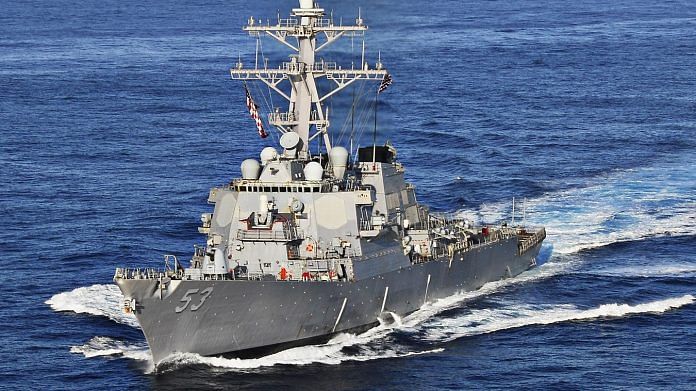On 7 April, USS John Paul Jones transited approximately 130 nautical miles West of the Lakshadweep Islands. This area falls within Indian Exclusive Economic Zone, or EEZ. Since then, all hell has broken loose in the media. The Narendra Modi government, with its Ministry of External Affairs statement, has raised concerns through diplomatic channels over the passage of the warship without any notice.
Diplomacy and security issues are two sides of the same coin in Statecraft. Occasionally, States use one to meet the other’s intended aims. In this case, the US Navy has intentionally announced its passage through Indian EEZ knowing fully well the loophole in the UN Convention on the Law of the Sea (UNCLOS). It has met its diplomatic intent of letting China know that the US doesn’t spare even its coalition partners when it comes to abiding by the rule of law.
In any straight line passage or sea lane of communication from the Gulf to the Dondra head of Sri Lanka, a vessel will invariably have to pass through these areas.
Does it mean that India’s concerns as notified by the MEA are not as per the UNCLOS? Not really. The MEA is absolutely right since the same article of the UNCLOS (Article 58) also specifies that vessels transiting through other coastal State’s EEZ must comply with UNCLOS and “regulations promulgated by coastal State”. And this part of regulation demands prior information to the Indian government. The action by USS John Paul Jones complies with UNCLOS, but it doesn’t meet the coastal State’s regulation. Possibly, these are the loopholes that have prevented the US from ratifying UNCLOS, though it is a signatory to the convention. Its selective application helps the US in punishing a target country.
Also read: What the illegal entry of USS John Paul Jones into India’s EEZ could mean
UNCLOS loophole
Article 58 of the UNCLOS lays down the rights and duties of other States in the exclusive economic zone (of another coastal State). It states that in the EEZ, “all States, whether coastal or landlocked, enjoy, subject to the relevant provisions of this convention, the freedoms referred to in article 87 of Navigation and overflight and of the laying of submarine cables and pipelines, and other internationally lawful uses of the sea related to these freedoms, such as those associated with the operation of ships, aircraft and submarine cables and pipelines and compatible with the other provisions of this convention.”
It further states that Article 88 to 115 and other pertinent rules of international law “apply to the EEZ in so far as they are not incompatible with this part”. It adds a caveat that in exercising their rights and performing their duties under the convention in the EEZ, States shall have due regard to the rights and duties of the coastal States and shall comply with the “laws and regulations adopted by the coastal State in accordance with the provisions of this convention and other rules of international law insofar as they are not incompatible with this part.”
It is this last part of the convention which states that the freedom of navigation of ships through the EEZ of a coastal State should not only be in compliance with the convention but also with regulations promulgated by the coastal State. In the case of India, the regulation of State warrants that exercises and manoeuvres by warships/submarines of another State in its EEZ be performed with prior notice. The statement issued by HQ 7th fleet that its destroyer John Paul Jones has exercised her right to freedom of navigation through Indian EEZ without prior intimation is only partially in compliance with the convention.
While UNCLOS permits freedom of innocent passage through coastal State’s EEZ, the convention also states that this right should be exercised in accordance with the convention and “regulations promulgated by the coastal State”.
In the overall analysis, the statement issued by HQ 7 Fleet of the US Navy was unwarranted and uncalled for. Given the naval cooperation between the two navies, the position of the US ship was known at all times from the time it emerged from the Gulf. It appears that the statement was intended to convey to China that the US Navy exercises its right to freedom of navigation through EEZ of even its coalition partners like India, and therefore the South China Sea (SCS) is not an exception.
The author is Former Commander in Chief Western Naval Command. Views are personal.




The US is nota signatory to the UN Convention on the Law of the Sea (UNCLOS) anyway. It is occupying the island of Diego Garcia belonging to Mauritius in the Indian ocean in blatant violation of UNCLOS and the ruling of the International Court of Justice in Hague. Why, Even India has objected to this illegal occupation by the US! The UN’s official maps have been changed to show the Chagos Archipelago, including Diego Garcia, as belonging to Mauritius! But the US wouldn’t let go of its illegal occupation of Diego Garcia!
But isn’t USA creating trust deficit with India? Already full trust is not restored in case of India’s relations with USA. By this action USA is heaping upon existing trust deficit sending a message that it cannot be depended upon. Shall USA has to prove anything to China by needling a friendly country which may appear to be an intention to appease or placate China.